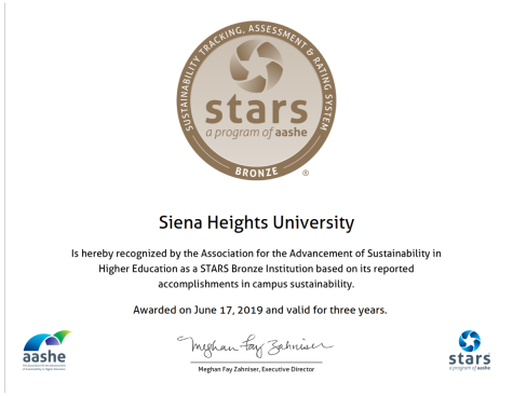The Saints of Sustainability
- MSU Agroecology Professor Jahi Cappell confirmed as the Winter 2024 Issa Speaker to present on April 25 7 PM
- More info under Issa Speaker Series
- 17th Environmental Documentary Series online
- Schedule under Environmental Documentaries
- The Sunrise Movement's Ann Arbor chapter to present at SHU on Monday, November 13, 2023, 6:30 PM
- More info under Events
- Siena Heights University contributes to automatic AI supported 24/7 bird monitoring with 3 Haiku Boxes
- Details and links to the latest bird detections under "ACHIEVEMENTS AND PLANS"
- SHU is a member of the National Sustainability Organization AASHE
- Take advantage of the membership benefits for all Sienaheights affiliates!
- More info under the tab AASHE
- Be gentle and kind to the planet and all inhabitants!

The Siena Heights' Sustainable College Committee was established in the fall of 2013 to promote sustainability into all college processes. In June 2019, we succeeded to submit our first report to The Sustainability Tracking, Assessment & Rating System (STARS) program of the Association for the Advancement of Sustainability in Higher Education (AASHE) thanks to the diligent work of our sustainability interns during the last 3 years. After a review of our report, we were awarded with the STARS Bronze certification. The full report was published on the STARS website and can be accessed here.
As an educational institution, our greatest goal is the inclusion of sustainability into the instructional curricula of all departments. This is needed to stimulate and challenge students to get involved in creative solution-building in their personal and professional lives. As sustainability is not living in ideas alone, we are also working on moving our institution towards greater sustainability in the maintenance and development of our main Adrian campus and satellite campuses.
As an educational institution, our greatest goal is the inclusion of sustainability into the instructional curricula of all departments. This is needed to stimulate and challenge students to get involved in creative solution-building in their personal and professional lives. As sustainability is not living in ideas alone, we are also working on moving our institution towards greater sustainability in the maintenance and development of our main Adrian campus and satellite campuses.

We achieved some of these projects fully or partially such as a comprehensive recycling program, enriched foods in our cafeteria (organically, locally, and humanely produced), enhanced energy conservation and the integration of SHU into the global community of environmentally- and socially-responsible universities, while others are on our radar as long-term goals such as the utilization of renewable energy sources and a poison-free campus environment (e.g., no use of pesticides, fertilizer, and coal and petroleum tar based pavement sealants. Since these projects are campus-wide, the Sustainable College Committee includes faculty and staff members from many departments, representatives of the SHU administration, a number of students of various majors, and several Adrian Dominican Sisters.
This beautiful paragraph from Pope Francis’ Laudatio Si depicts the essence of sustainability:
159. The notion of the common good also extends to future generations. The global economic crises have made painfully obvious the detrimental effects of disregarding our common destiny, which cannot exclude those who come after us. We can no longer speak of sustainable development apart from intergenerational solidarity. Once we start to think about the kind of world we are leaving to future generations, we look at things differently; we realize that the world is a gift which we have freely received and must share with others. Since the world has been given to us, we can no longer view reality in a purely utilitarian way, in which efficiency and productivity are entirely geared to our individual benefit. Intergenerational solidarity is not optional, but rather a basic question of justice, since the world we have received also belongs to those who will follow us. The Portuguese bishops have called upon us to acknowledge this obligation of justice: “The environment is part of a logic of receptivity. It is on loan to each generation, which must then hand it on to the next”. An integral ecology is marked by this broader vision.
Contact us at: [email protected]
This beautiful paragraph from Pope Francis’ Laudatio Si depicts the essence of sustainability:
159. The notion of the common good also extends to future generations. The global economic crises have made painfully obvious the detrimental effects of disregarding our common destiny, which cannot exclude those who come after us. We can no longer speak of sustainable development apart from intergenerational solidarity. Once we start to think about the kind of world we are leaving to future generations, we look at things differently; we realize that the world is a gift which we have freely received and must share with others. Since the world has been given to us, we can no longer view reality in a purely utilitarian way, in which efficiency and productivity are entirely geared to our individual benefit. Intergenerational solidarity is not optional, but rather a basic question of justice, since the world we have received also belongs to those who will follow us. The Portuguese bishops have called upon us to acknowledge this obligation of justice: “The environment is part of a logic of receptivity. It is on loan to each generation, which must then hand it on to the next”. An integral ecology is marked by this broader vision.
Contact us at: [email protected]

